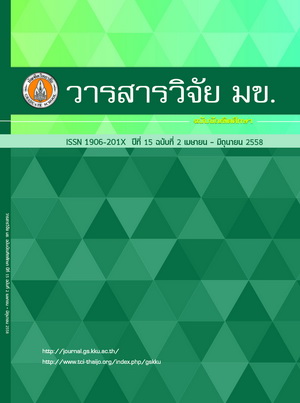An Evaluation of Dispersivity in Solute Transport Modeling of The Aquifer Storage and Recovery Project in Sukhothai Province (การประเมินการแพร่กระจายสำหรับแบบจำลองการเคลื่อนที่มวลสาร ในโครงการเติมน้ำลงสู่ชั้นน้ำบาดาลจังหวัดสุโขทัย)
Keywords:
Solute transport model, Dispersivity, Aquifer Storage and Recovery (ASR)Abstract
ABSTRACT
Solute transport modeling is constructed as part of a recent, large-scale Aquifer Storage and Recovery (ASR) project in Sukhothai Province, Thailand. The model simulates movement of a chloride plume caused by injection of treated surface water into Upper and Lower aquifer during 30 and 90 days pilot tests. In this study, laboratory column tracer test on representative sample from the two aquifers are used to refine dispersivity parameter in the original model. Chloride breakthrough curves, obtained in three laboratory-scale test, provided a range of dispersion coefficients for performing solute transport model based on laboratory-scale dispersivity property. The evaluated new values are used in the original solute transport model, to illustrate the importance of site scale dispersivity of the groundwater injection zone. Groundwater model is established according to hydrogeology and the onsite hydraulic conductivity data. The results illustrate the movement of the chloride plume in both aquifer in the southeast direction in accordance with the groundwater flow model. For long term operation, ASR technology can be beneficial to groundwater resource of Sawankhalok district, Sukhothai province.
บทคัดย่อ
แบบจำลองการเคลื่อนที่มวลสารเป็นส่วนหนึ่งในการศึกษาโครงการเติมน้ำลงสู่ชั้นน้ำบาดาลจังหวัดสุโขทัย แบบจำลองนี้แสดงขอบเขตการเคลื่อนที่ของคลอไรด์ในชั้นหินให้น้ำระดับบนและระดับล่างขณะทดสอบระบบเติมน้ำระยะ 30 และ 90 วัน การประเมินค่าการแพร่กระจายของชั้นหินให้น้ำทั้งสองจะทำโดยการปล่อยสารติดตามผ่านตัวอย่างของชั้นหินให้น้ำที่บรรจุในคอลัมน์ สัมประสิทธิ์การแพร่กระจายคำนวณได้จากกราฟการเปลี่ยนแปลงความเข้มข้นของคลอไรด์ ถูกใช้ในการประเมินคุณสมบัติการแพร่กระจายสำหรับแบบจำลองการเคลื่อนที่มวลสารซึ่งแสดงบริเวณที่มีการเติมน้ำลงสู่ชั้นน้ำบาดาล แบบจำลองการไหลน้ำบาดาลถูกสร้างขึ้นจากข้อมูลอุทกธรณีวิทยาและค่าสัมประสิทธิ์การยอมให้น้ำซึมผ่านซึ่งทดสอบ ณ สถานีเติมน้ำ ผลการทดลองพบว่าขอบเขตการเคลื่อนที่ของคลอไรด์ในชั้นหินให้น้ำทั้งสองนั้นเคลื่อนที่ไปในทิศทางตะวันออกเฉียงใต้เช่นเดียวกับแบบจำลองการไหลน้ำบาดาล ในระยะยาวเทคโนโลยีการเติมน้ำลงสู่ชั้นน้ำบาดาลนี้เป็นประโยชน์ต่อทรัพยากรน้ำบาดาลของอำเภอสวรรคโลก จังหวัดสุโขทัย



